Kofta
Kofta is a family of meatball or meatloaf dishes found in the Indian subcontinent, South Caucasian, Middle Eastern, Balkan, and Central Asian cuisines. In the simplest form, koftas consist of balls of ground meat - usually beef, chicken, lamb or mutton, pork, or a mixture - mixed with spices or onions. In Muslim cultures, pork is not commonly used. In many areas in India, beef is not commonly used. In Greece and Cyprus, vegetarian versions are known as hortokeftedes (Greek: χορτοκεφτέδες), and often eaten during fasting periods such as Lent. An uncooked version is also made in Turkey, called çiğ köfte. In India, vegetarian varieties may use potato, calabash, paneer, or banana. In Europe, kofta is often served in a fast-food sandwich in kebab shops.

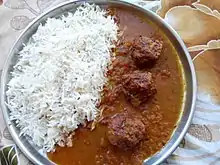
Koftas in India are usually served cooked in a spicy curry and are eaten with boiled rice or a variety of Indian breads. In Iran, Iraq, Pakistan and Azerbaijan, koftas are served with a gravy, as dry variations are considered to be kebabs. Shrimp and fish koftas are found in South India, West Bengal, and some parts of the Persian Gulf.
Etymology
The word kofta comes from Persian kufta (‘rissole’).[1] The languages of the region have adopted the word with minor phonetic variation.
Variations
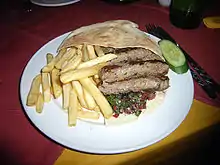
The meat is often mixed with other ingredients, such as rice, bulgur, vegetables, or eggs to form a smooth paste. They can be grilled, fried, steamed, poached, baked, or marinated, and may be served with a rich spicy sauce. Koftas are sometimes made from fish or vegetables rather than red meat.[2] Variations occur in North Africa, the Mediterranean, the Balkans, and India. They can be shaped into patties, meat balls, or cigar-like shapes.
Early recipes (included in some of the earliest known Arabic cookbooks) describe seasoned lamb rolled into orange-sized balls, and glazed with egg yolk and sometimes saffron. This method was taken to the West and is referred to as "gilding" or "endoring". Many regional variations exist, notable among them include the unusually large Azerbaijani (Iranian) Tabriz köftesi, having an average diameter of 20 cm (8 in).[3]
Albania
In Albania, specialized shops called qofteri offer qofte. They are considered to be a specialty of Korçë, where they are called kernacka. Qofte are usually served on a metal plate, salted, and topped with fresh raw onions with bread. Beer is the most popular beverage accompaniment.
Balkans
In the former Yugoslav republics, present-day Bosnia, Croatia, Montenegro, Serbia, North Macedonia and Slovenia, they are called kjofte, ćufte, ćufteta, čufti, or mesne okruglice. They are made of any single meat including fish, or mixture of meats, mixed with finely chopped onions, breadcrumbs, eggs, and seasonings. They are most often made by first being browned and then simmered in a roux made with paprika called crvena zaprška "red roux", or in a tomato sauce similar to Italo-American meatballs.
Bulgaria
In Bulgaria, kyufte is usually made from pork, beef, or veal, or a mixture of the three. They are usually served as a meze with salads, fried potatoes or tarator.
Cyprus and Greece
In Greece and Cyprus, kofta are known as keftedes or keftedakia (Greek: κεφτέδες, κεφτεδάκια) and are usually cooked by being fried and eaten with tzatziki or yogurt.
The name is also given to fried vegetarian fritters, such as kolokytho-keftedes (courgette fritters), tomatokeftedes (tomato fritters), horto-keftedes (wild green fritters), etc.[5]
India
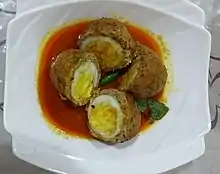
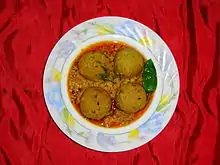
Sushrutha Samhita mentions meatballs made of ground meat and was termed pishtha.[6] Koftas in the cuisine of the Indian subcontinent are normally cooked in a spiced gravy, or curry, and sometimes simmered with hard-boiled eggs. Vegetarian koftas are eaten by a large population in India. The British dish Scotch egg may have been inspired by the Indian dish Nargisi kofta, where hard-boiled eggs are encased in a layer of spicy kofta meat.[7] In Bengal, a region of eastern India, koftas are made from prawns, fish, green bananas, cabbage or meat, such as minced goat meat.
Israel
In Israel, meat kofta is part of the Mizrahi Jewish cuisine, and is made of minced meat, herbs, and spices, and cooked with tomato sauce, date syrup, pomegranate syrup, or tamarind syrup with vegetables or beans. A fish variety is prepared with minced fish, coriander, dried peppers (bell peppers and chili peppers), onion, black pepper, and salt, and is usually cooked in a tomato stew with chickpeas or white beans. The word kufta in Modern Hebrew, however, is used to describe a broad variety of dough dumplings, and was coined after the mention in the Jerusalem Talmud, written circa 200 CE.[8]
Jordan and Palestine
In Jordan, they are usually made of beef, chicken, lamb, or a mixture of chicken and beef with allspice, parsley, mint, onion, black pepper, and salt and are fried in olive oil or cooked in tomato or pomegranate stews. Kofta in the Palestinian Community is very similar to the Jordanian kofta. It also pronounced as kafta, is made of minced meat, usually beef or veal, or a mixture of beef with lamb. It contains herbs, finely chopped onions and spices, and it is either flattened on a tray and called suneyet kofta, or made into patties; the kofta is then either baked or cooked and simmered with tomato sauce, tahini sauce, date syrup, pomegranate syrup, or tamarind syrup, and typically accompanied by potatoes or other vegetables. Another common variety of Palestinian kofta is a kofta bi batata, which consists of a bed of thinly sliced potatoes in layers under flattened kofta baked in a tray.
Lebanon
In Lebanon, kafta is usually prepared by mixing the ground beef with onion, parsley, allspice, black pepper, and salt.[9]
Pakistan
In Pakistan, koftas are made from ground beef with onion, spices and salt. They are served with a rich curry, commonly made of mutton, chicken or beef mince. Kofta curries are enjoyed with rice, but a variety of flatbreads can also compliment the dish. Nargisi kofta with hardboiled egg encased in spicy kofta is also popular. These dishes also make up part of formal dinners.[10]
Romania
In Romania, a local variety of kofta is known as chiftele or chiftea. They are usually made from minced pork, mixed with mashed potatoes and spices, then deep-fried. They are served with pilaf or mashed potatoes. The Romanian Jews prepare a version of lofts which has a large amount of garlic and parsley, along with a small amount of sugar. Their traditional kofta is often served with an eggplant salad, and is sometimes called "garlic torpedoes" in the West.
Turkey
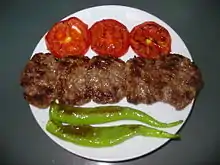
According to a 2005 study undertaken by a private food company, 291 different kinds of köfte (being the Turkish word for kofta) were found in Turkey, illustrating the importance of the dish in the Turkish cuisine.[11] Turkish variations include a meatball stew called sulu köfte; batırık köftesi, a vegan variety that uses tahini as a binding ingredient instead of the usual egg; çiğ köfte, made with bulgur and sometimes raw meat, and içli köfte, a deep-fried bulgur paste shell stuffed with kibbeh; and many others.
See also
References
- Alan S. Kaye, "Persian loanwords in English", English Today 20:20-24 (2004), doi:10.1017/S0266078404004043.
- Abdel Fattah, Iman Adel (5 December 2013). "Bites Fil Beit: Koftet el Gambari – Shrimp kofta". Daily News Egypt. Retrieved 19 April 2015.
- The Oxford Companion to Food, s.v. kofta
- Tilsley-Benham, Jill (1986). "Sheep with Two Tails: Sheep's Tail-Fat as Cooking Medium in the Middle East". Oxford Symposium on Food & Cookery. The Cooking Medium. p. 48 – via Google Books.
- Aglaia Kremezi and Anissa Hellou, 'What's in the Name of the Dish' in Richard Hosking (ed.), Food and Language: Proceedings of the Oxford Symposium on Food and Cooking 2009 (London: Prospect Books, 2010) 206
- Achaya, K. T. (December 1997). Indian Food Tradition A Historical Companion. Oxford University Press. p. 54. ISBN 0195644166.
- Davidson, Alan (2014). The Oxford Companion to Food. Oxford University Press. p. 724. ISBN 978-0-19-967733-7.
- "Maachalim LaChag" מאכלים לחג [Holiday Food] (in Hebrew). The Academy of the Hebrew Language. 14 March 2013.
- "Basic Kafta Recipe by dianak". Archived from the original on 4 April 2012. Retrieved 7 September 2016.
- Fatima, Bushra (30 June 2015). "Pakistanis' love for the succulent kofta curry". The Express Tribune. The Express Tribune. Retrieved 5 July 2020.
- "Türkiye'nin tam 291 köftesi var" [Turkey has 291 meatballs]. Sabah (in Turkish). 6 March 2005.
External links
| Look up kofta in Wiktionary, the free dictionary. |




